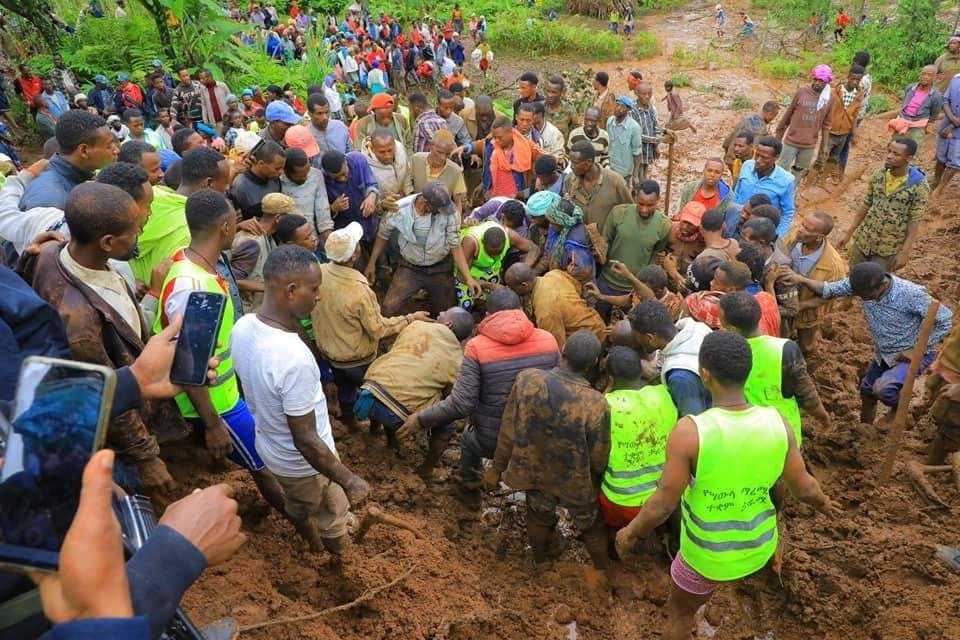Devastating Landslide in Southern Ethiopia Claims at Least 257 Lives, Risk of Death Toll Soars to 500
Current Affairs International IssuesPosted by pallavi on 2024-07-29 05:32:03 |
Share: Facebook | Twitter | Whatsapp | Linkedin Visits: 98

On July 24, 2024, a catastrophic landslide struck Kencho Shacha Gozdi, a remote locality in southern Ethiopia's Gofa Zone, causing significant devastation. This disaster, described as the deadliest landslide on record in Ethiopia, has resulted in at least 257 confirmed deaths, with the toll potentially rising to 500. The event occurred following heavy rains in the region, roughly 480 kilometers from the capital, Addis Ababa.
The landslide's impact has been severe, with rescue efforts ongoing as local residents, using makeshift tools and their bare hands, search through the mud for survivors and victims. The UN’s humanitarian agency OCHA has reported that more than 15,000 people need to be evacuated due to the high risk of further landslides. This includes vulnerable groups such as 1,320 children under five years old and 5,293 pregnant women or new mothers. Aid, including life-saving supplies from the Ethiopian Red Cross Society, has started to reach the isolated area, though the situation remains dire.
Local authorities and the UN have expressed deep concern over the scale of the disaster. UN Chief Antonio Guterres has conveyed his condolences, and the UN is working closely with the Ethiopian government to assess the damage and provide humanitarian assistance. The response includes dispatching food, health supplies, and other critical resources to the affected population.The landslide's deadliness is underscored by its scale. It surpasses previous disasters in Ethiopia, such as a 2017 incident where 113 people died due to a garbage dump collapse in Addis Ababa. Historically, Ethiopia has been prone to climate-related disasters, including floods and droughts, which have exacerbated the country's vulnerability. For instance, seasonal rains between April and May 2024 led to significant flooding and displacement in South Ethiopia, affecting over 19,000 people.
The affected area, described as rural and mountainous, has long been prone to such disasters due to its soil composition and geography. The landslide struck after a series of heavy rains, a pattern familiar in the region's seasonal cycles. Previous incidents, including a landslide in May that killed more than 50 people, highlight the recurrent nature of these disasters.
International reactions have included expressions of solidarity and support. The African Union Commission has extended its condolences and support to Ethiopia, emphasizing solidarity with the affected communities.
Search
Categories
Recent News
- Army's Precision Strike: Top Terrorists Neutralized in J&K
- Locked in a Box: Teen's Harrowing Rescue from Captivity
- JEE Main 2026: Unlocking the Answer Key
- Bengaluru's Power Outage: A City in the Dark
- Modi's Israel Visit: Strengthening Strategic Ties
- MS Dhoni's Vision for India's Future: The Longevity of Rohit and Kohli
- Pawan Kalyan's Telangana Campaign: A Political Strategy
- Hyderabad's Pedestrian Revolution: A City Reclaims its Footpaths
Popular News
- Navigating IPO Market Dynamics Amid Volatility and Regulatory Changes
- Massive Worldwide Microsoft Outage Disrupts Multiple Sectors
- Panjapur Bus Stand to Reshape TNSTC Routes
- తెలుగుదేశం పార్టీ - పేదరికాన్ని నిర్మూలించడంలో వాగ్దానం
- Universities Embrace Remote Learning Technologies Amidst Ongoing Pandemic